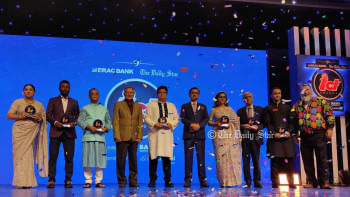Reform from ground up needed for media to speak for nation

Experts and broadcast professionals at an event today said alongside media laws, fundamental reforms are necessary in the institutional structures that govern the ownership and operation of media.
They said this at a roundtable titled "Manusher Pokkhe Broadcast Media"
Bangladesh Next organised the programme at Drik Path Bhavan, Dhaka.
The event was jointly organised by the Pathshala South Asian Media Institute and the Innovation Center for Resource Diversity (ICRD), moderated by Zeeshan Kingshuk Huq, founder of ICRD and a tech entrepreneur.
The session began with a research-based presentation by Dr Khorshed Alam, associate professor at Dhaka University's Department of Mass Communication and Journalism.
The event received additional support from The Marvel – BU and CThreeSixty Bangladesh.
Academics, activists, media journalists, producers, advertisers, social media influencers, and university students highlighted the need for significant reforms in Bangladesh's broadcast and visual media sector, including television, social media, YouTube, OTT platforms, and other digital platforms.
They discussed the challenges facing the media, such as political interference, censorship, and financial issues.
In his opening remarks, Dr Shahidul Alam, managing director of Pathshala, said, "The credibility gap in the media has existed for a long time and continues to persist. Unless this changes, we cannot call it 'mass media.'"
Senior journalist Ashraf Kaiser stated, "Advertising agencies control the media more than the government. Agencies control the channels through revenue management. This media-mafia relationship between advertising agencies and broadcasters must end."
Proposing the implementation of a pay-channel policy, Talat Mamun, executive director of Channel 24, said, "Our media lacks independent revenue streams. Without moving to a subscription-based business model, channels will never be self-reliant."
Media professional Abdun Noor Tushar commented, "A large portion of the channels' rightful earnings are going to intermediaries. We need an infrastructure to address this. Many influential TV owners do not want to follow pay-channel rules."
Corruption within advertising agencies and journalism was also discussed.
Ashraf Kaiser pointed out, "There are cases where journalists themselves have voluntarily reported to the DGFI."
DU Professor Chowdhury Saima Ferdous raised concerns about accountability, stating, "We need to think about who the media should be accountable to. Who will train the owners on ethical issues?"
On the same note, Malik Mohammed Sayeed, COO of Square Toiletries Limited, said, "Agencies and TV stations are operating based on quotas. We still advertise based on assumptions, with no clear visibility."
The participants also emphasised the need for multiple sources of TRP (Television Rating Points) and discussed tax evasion in the industry.
Dr Samina Luthfa proposed bringing transparency through research on the media's "value system."
Tajdin Hassan, chief business officer at The Daily Star, said, "Editors need to strengthen their backbone, and accountability must be built within the media."
Participants from Bangladesh Next, including Munaf Mojib Chowdhury and ABM Jaben Sultan, digital head of Prothom Alo, emphasised the importance of investing in technology-driven business models for media ownership.
One of the main points discussed was the strength of media content. Zeeshan Kingshuk Huq remarked, "The current generation is not tuning into existing channels because they feel disconnected from the media."
The roundtable emphasised the need for clear advertising policies, the expansion of the Press Council's authority, and making access to information under the Right to Information Act more transparent.
Other notable participants included Fahim Mashroor, convener of Voice for Reforms; ABM Jabed Sultan, chief digital business officer at Prothom Alo; Mohammad Ali Haider, head of content at Bongo BD; Kha Ma Harun, principal at Pathshala South Asian Media Institute; Shubhashish Bhowmik, country director at ATEC Australia; Syeda Sadia Mehjabin, adviser at Dhaka International Mobile Film Festival; N Rashed Chowdhury, assistant professor at Pathshala South Asian Media Institute; Shahryar Nasir Khan, director of Research and Client Services at Somra MBL Limited; Munaf Mojib Chowdhury, founder of Ekshathe Foundation; Sakib Ar Khan, country director at Hoichoi Bangladesh; and Brity Sabrin, co-founder of The Marvel -- Be You.


 For all latest news, follow The Daily Star's Google News channel.
For all latest news, follow The Daily Star's Google News channel. 



Comments